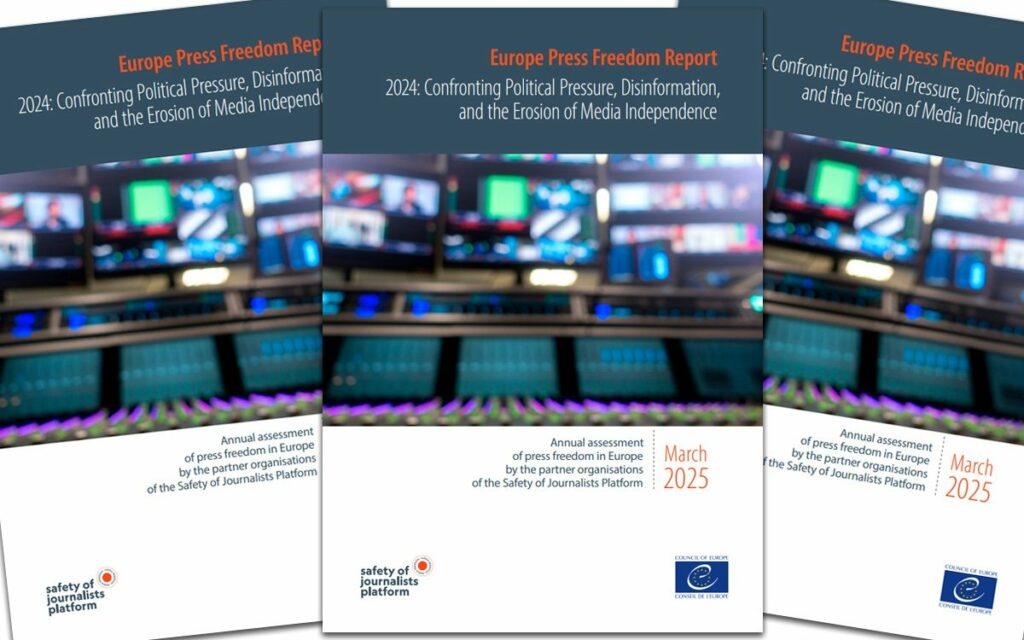
By Jan Rehaag
Threats to press freedom in Europe remained alarmingly high in 2024, with journalists facing physical attacks, intimidation, and detention, according to the latest Europe Press Freedom Report. Especially concerning is the situation in Ukraine, Russia, Türkiye, Serbia, and Georgia, where the highest number of media freedom alerts have been registered.
The report, which has been published by the Safety of Journalists Platform since 2015, has recorded 266 alerts in 2024, which is comparable to the last year but significantly higher than pre-COVID levels.
War: A significant threat to journalists
Central to the Europe Press Freedom Report are threats posed to journalists by war. Journalists in Ukraine and Russia risk death, imprisonment, and censorship.
40 alerts alone were reported in Ukraine, with most violations being committed either in Russian-occupied territories or by Russian forces.
“The first and most immediate threat to media in Ukraine is from Russia. […] Several dozen Ukrainian journalists have been killed since the start of the full-scale war,” said Olga Rudenko, chief editor of the Kyiv Independent, during a press conference at Brussels’ Residence Palais on March 5.
An example illustrating the dangers faced by many Ukrainian journalists is the story of Viktoria Roshchyna, a Ukrainian journalist who died in Russian captivity in September 2024. Russian authorities have not disclosed the circumstances of her death, with the report stressing the importance of transparency and accountability.
In addition to threats from Russia, Ukrainian journalists face growing threats from the Ukrainian government. The Ukrainian parliament debated a bill in December 2024 that aims to introduce eight-year prison sentences for publishing “confidential information”, a bill that could easily be abused, according to the report.
For Russia, 32 alerts have been registered in 2024, with at least 29 journalists having been imprisoned by December. Independent journalism has seen further suppression and censorship in the context of the war over the past year. The banning of foreign news outlets has strengthened state-controlled media and isolated the Russian public from global information networks.
A worrying new development, especially for Russian and Belarusian journalists, is transnational repression, which describes the targeting of journalists in exile. The document criticizes an increase in the surveillance, harassment, and intimidation of journalists abroad. Some governments increasingly misuse international legal instruments, such as Interpols’ “red notices,” to intimidate journalists.
The Safety of Journalists Platform also warns about harassment and threats against journalists in the context of the Gaza war, with NGOs urging Israeli authorities to allow press access to the Gaza Strip and ensure the safety of Palestinian journalists.
Rise of illiberal parties and media capture
Populist and illiberal parties have expanded their influence through numerous elections in 2024. The Platform calls these parties a “significant threat to the coalitions that have traditionally championed media freedom and pluralism in the EU”.
Another threat to press freedom is media capture, which is the misuse of state powers to gain control over the media.
In Georgia, press freedom alerts have increased threefold compared to last year. After pro-European protests erupted following the suspension of EU talks by the pro-Russian party, Georgian Dream, journalists covering the protests have been subjected to police brutality, like assaults, arrests, and obstruction of their professional duties.
The Georgian parliament has also adopted laws that “raise serious concerns about the future of media freedom,” as outlined in the report. “Georgia continues to descend towards autocracy at high speed,” warned Lia Chakhunashvili, executive director of the Georgian Charter of Journalistic Ethics.
“From April 2025, we fear that we will not have any independent media outlet or NGO left in Georgia. We fear that soon, we critics of oligarch Bidzina Ivanishvili will either be locked up in a prison or forced to flee the country,” she added.
Artificial intelligence and SLAPP lawsuits
Technological advancements like artificial intelligence also pose a significant risk to press freedom. Disinformation campaigns, deepfake videos, and automated harassment, all of which are further enabled through AI, are used to discredit journalists and erode public trust in media, states the report.
Positive developments can be seen in the fight against SLAPP lawsuits, where various laws and directives have provided a better and safer environment for journalists and press freedom. However, the report still sees challenges with the implementation of these measures on a national level.
The Safety of Journalists Platform was launched in 2015 after the terrorist attack against the French satirical weekly, Charlie Hebdo. It is a joint project of the Council of Europe and 15 press freedom organisations of which the AEJ is a part. Since its inception, it has registered nearly 2000 media freedom alerts.
